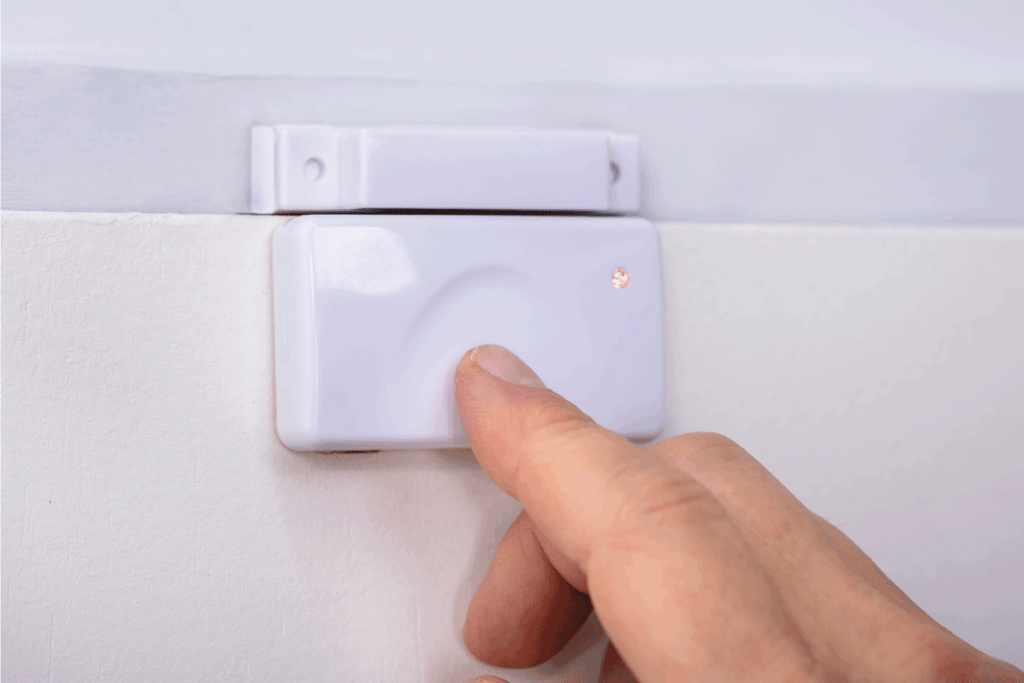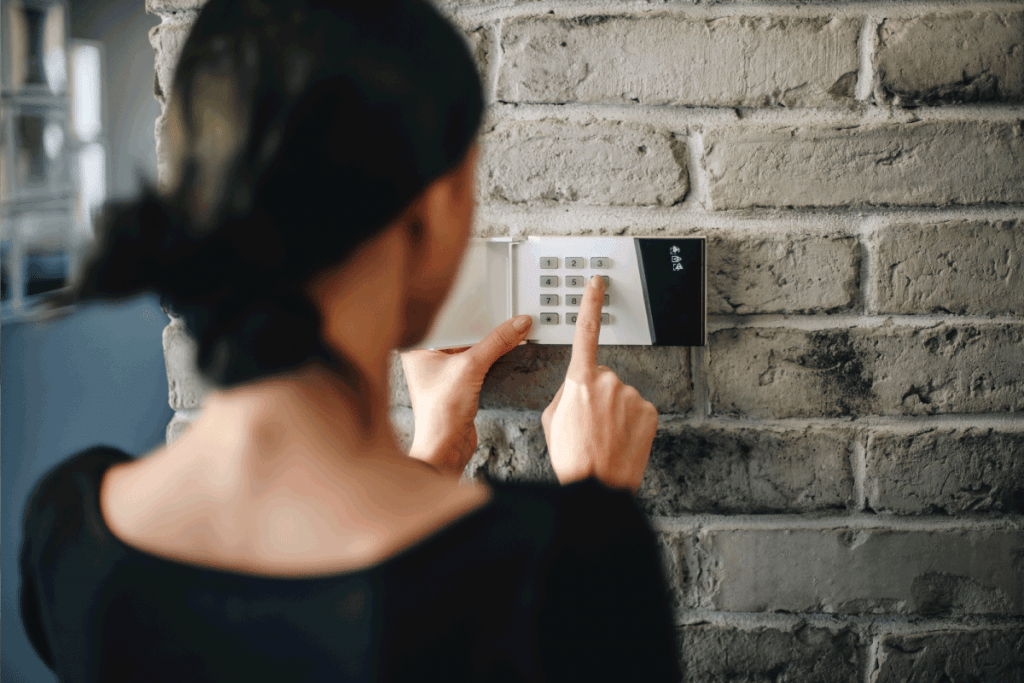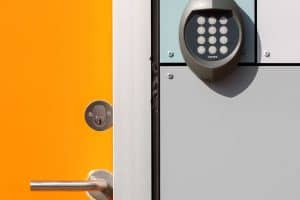Door security alarms are an essential part of every home. With these ingenious systems, you can directly tell whenever someone is at your doorstep, maneuvering a break-in attempt. They are such helpful tools that can keep you and your household safe and secure. As good as they are, they can be annoying too, especially when you have guests visiting over. We've done our research to find ways to troubleshoot this frustrating problem.
Luckily for you, stopping the alarm from beeping is simple and does not require any tools. You only need to directly go to your door alarm system and follow the steps below:
1. Open the door on the front of the alarm and simultaneously press the asterisk (*) and number 4 buttons, the functions used among door chimes.
2. When the prompt goes off, press the “chime” button commonly found at the right side of the alarm system for 2-5 seconds. And you’re done.
You can turn it back on using the same process. But you need to know more than just disabling the door alarm. In this post, we'll provide you information about the subject to ensure your safety in your home. We've also added what burglars use to bypass home alarm systems so you can stop them on their tracks.

Why does the alarm beep when I open the door?
You might be familiar with several home alarm systems, but have you ever wondered how and why they beep whenever you open the door? The reason is simple, as it turns out.
The “beep function” in alarm systems is called the “chime control” that regulates the audible tone of your home security alarms. How this works is through magnetic contact sensor technology.
Alarm systems commonly operate with a two-piece magnetic contact sensor. Whenever your door opens, these sensors separate and trigger the alarm or chime to go off. As a result, you are immediately alerted of the activity in your main door.
In a sense, they resemble “voice descriptors” of a home automation panel without the verbal warnings of what triggered the alarm system. Fortunately, some home alarm systems have become smart enough to send an alert message to a homeowner when the security zone is triggered.
How do you stop a door sensor?

While a door alarm system is a key to your security, it can sometimes become annoying if you’re home and all family members are around. During these instances, you may want to stop the chime from sounding off. Fortunately, there are ways you can achieve this regardless if it’s a magnetic sensor or a button alarm. Read the methods below to find out how:
Stop magnetic door sensors using a standard magnet
You can find an escape route through a window without a sensor installed to prevent your home door alarm from sounding off. But doing that every time can be a pain in the neck, and you might even appear like a burglar.
Fortunately, based on our research, there’s one way you can disable the sensors in your door. It’s through using another magnet. The steps below are what will help you stop the sensors from giving the alarm system to sound the chime:
1. Determine where the magnet is
If you did not install the alarm system yourself, chances are you don’t have an idea where the magnet is. So, examine the mechanism first to determine where the magnetic sensor is.
The magnetic sensor usually appears like a small metal box with some dark magnet pieces protruding. They commonly have two parts: the stationary “sensor” or the one attached to the door frame and the movable “magnetic” one installed on the door or window.
2. Place the magnet on top of the sensor
Get a standard or fridge magnet and put it on top of the stationary sensor. This way, you can fool the sensor that the door is closed even when it’s open. However, remember that this may not work a hundred percent of the time because some sensors have high quality.
Another reason this method might not work is some magnetic sensors are intentionally placed inside the door jamb to prevent the system from being bypassed through this method. In this case, it’s best to proceed to the next step.
3. Remove the movable magnet
More sophisticated home security systems call for a more drastic measure to prevent it from setting off the alarm. And that involves removing the movable “magnet” from the door.
Using a screwdriver, remove the movable part of the magnetic sensor from the door. Keep the screws and the alarm. Ensure you have a re-installation guide when you want to attach the magnetic sensor back.
Once removed, leave the door open and place the magnet on the stationary sensor. Keeping the door open is necessary to avoid the alarm from activating because of the missing magnetic sensor.
Close the door and check if your security system reads the door as closed. If it does, that means that you have just bypassed the security sensor of your door.
Disable button door sensors
If you have button door sensors instead of magnetic ones, you will only need to place something, such as cardboard, to block the button. To do so, make use of the quick steps below:
1. Slowly open your door until the button becomes slightly visible and accessible.
2. With a popsicle stick or cardboard, pin the button down with enough pressure to prevent the alarm from chiming.
3. Using electrical or duct tape, fasten the card or popsicle stick to the button. You now have disabled the button door sensor.
How do burglars bypass alarm systems?
As you’ve seen above, it only takes a little maneuvering to disable your home alarm system on your own. Thus, the likelihood of burglars doing the same is indisputably high. And aside from the methods above, burglars have their various ways of defeating your alarm systems. Knowing them is essential to secure your home and maintain your peace of mind.
Here are some of the techniques burglars have at their disposal to bypass your home security systems:
1. Finding weak and unmonitored spots
Burglars are master finders of the vulnerabilities of a house. Even if a home has security alarms, they can easily find weak spots like the bedrooms.
Most homeowners only equip their main doors and windows that they sometimes neglect the security of their bedrooms. And putting up signs on their lawns doesn’t help either, as this unintentionally provides burglars an idea of where the security alarms are.
2. Cutting off phone lines
If burglars know your home possesses a security system, they can immediately assume that it’s connected with your communication lines. Homes that still use traditional landlines are the most vulnerable to this kind of burglar attack.
3. Decoding your security pass
Some homeowners are too predictable when creating a passcode for their home.
An analysis done by Seattle-based engineer and data blogger Nick Berry revealed that out of 10,000 possible PIN combinations from 0-9, 1234 is the most commonly used, accounting for almost 11%. In addition, some homeowners still use the too predictable birthday numbers accessible to the public via public records and social media.
Burglars can take advantage of this to bypass security systems in a considerable number of homes.
4. Remote arming and disarming
Some burglars keep up with technology. That’s a fact you should remember all the time. They can easily hack into your alarm system and disarm them remotely. Armed with the knowledge that home security systems work with keychain remote, skilled burglars can pick up or jam these chains to negate them like air.
5. Taking advantage of a power outage
Sometimes, burglars bide their time, waiting for the perfect moment. And what time would be better than a power outage? Most homes are still dependent on the grid, which is why they become extraordinarily vulnerable when there is sudden energy shut off.
To prevent these from happening, you have to outsmart burglars. Luckily for you, the answers to these security vulnerabilities also lie in them.
How to keep door alarms effective?
The efficiency of door alarms against burglars starts with the proper installation and configuration of your home system. If you’re not familiar and well versed with the process, calling in a professional will reduce your susceptibility to criminal intrusion.
Install security systems in your kitchen door, bedroom windows, and even the garage door. For each of these alarm systems, use different passcodes that only your family knows. Use note-taking apps to save each passcode just in case you forget them.
Also, move away from landline-based monitoring and take advantage of cellular dialers as they only need your cellular network to connect with the system. And if your budget allows, install a small solar panel that will be able to power your home security system even during a blackout.
In Closing
You can stop your door alarm system from chiming when people are around by pressing the asterisk (*) and number (4) buttons. And if you want to disable the sensor from picking up intrusion signals when unnecessary, adding a magnet on the sensor or blocking the button alarm will do the trick. However, remember to turn them back on to protect your home from burglars and criminal raids.




